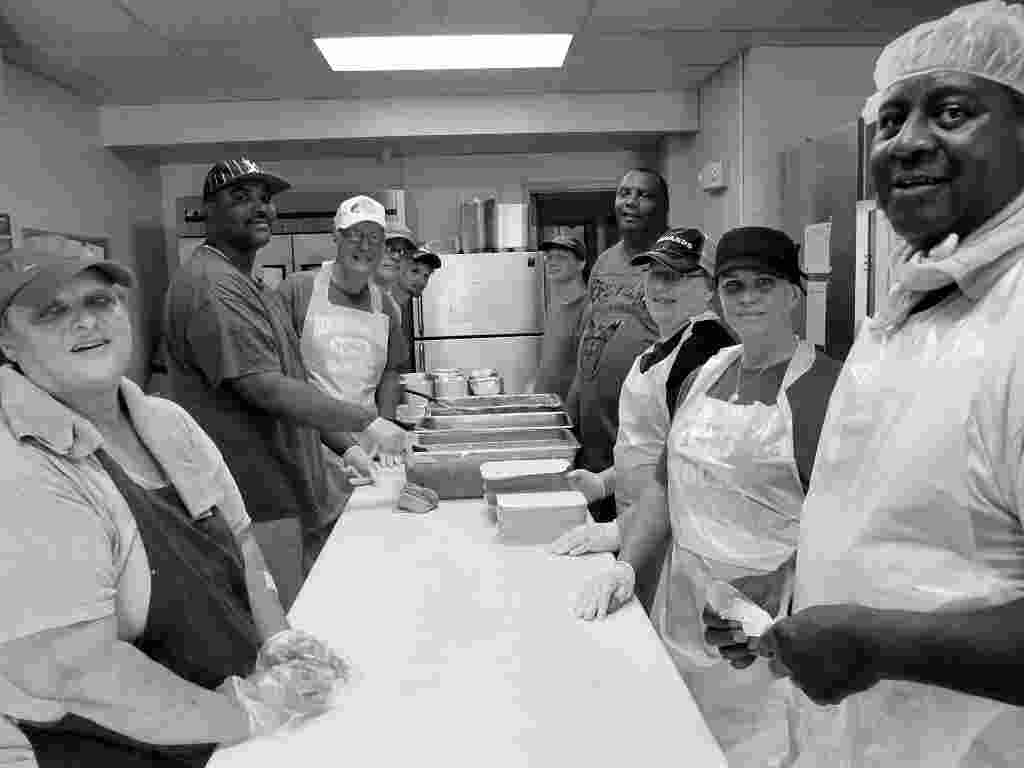
Cooking begins very early each weekday morning at Neighborhood House in Peoria. Staff at the social service agency, located at 1020 S. Matthew Street, prepares food for some 850 meals to serve people in the city of Peoria, Peoria County and Tazewell County. Primary recipients for the meals are folks 60 years of age and older who are unable to grocery shop or cook for themselves because of illness or frailness. Some people under 60 with disabilities also receive meals. Food is delivered for the noon meal, and some folks receive an additional meal for the evening and/or weekends. Those individual meals are delivered to people living in private homes, senior residence facilities, and apartments by a staff of 11 drivers who deliver to those in Peoria.
Neighborhood House has been serving meals to seniors and shut-ins since 1971 when the program was originally called Meals With Love. While love can’t be packaged in a container with the entrée, even the brief visit from the driver makes a significant difference to the meal recipient. “Sometimes that social contact is almost as important a component as the food,” says Karen Long, Senior Nutrition Director. “The meals allow people to remain in their homes. They may not need the whole suite of services for seniors, but they do need the meal. We want people to be able to stay in their homes as that’s a better situation for all.”
The large kitchen at Neighborhood House and the auxiliary rooms filled with food items, freezers and supplies are bursting with activity as meals are prepared, packaged, and put into insulated containers for delivery. Tazewell County packages their own meals after large containers of food are delivered to them each weekday morning.
In assembly-line fashion some 590 meals are packaged for delivery in the city of Peoria. Each person also receives bread in a separate bag and a container of milk. Drivers are out the door at approximately 10:30 a.m. regardless of weather. If a winter storm warning is issued for the following day, drivers take double meals out the day before.
Becky Rossman, recently hired as Executive Director of Neighborhood House, says, “the drivers are dedicated and people receiving meals often form a bond with them. If there’s a substitute on the route, the people ask about their regular driver, often saying ‘Make sure you tell my driver how much we like him or her.’”
Now called Meals on Wheels, the greatly expanded program is funded in part by federal and state governments, Heart of Illinois United Way, Central Illinois Agency on Aging, grants, and private donations. People often mistakenly think the food program is totally paid for by the government, but that is not true. For individuals wanting to receive meals, sometimes the different funding guidelines for different programs may seem confusing. Karen says she receives some 15 calls each day concerning questions, concerns, and referrals of people from hospital personnel, cancer centers or dialysis centers. “It can be confusing,” says Karen, “but we send perspective meal recipients papers and I’m available to answer questions.”
She adds, “We always ask for contributions.” Some people, wishing to avoid disclosing personal information, opt for private pay. Receiving meals does obligate the individual to be willing to provide pertinent information. Karen explains the program is more about needs than financial criteria. “This can be your neighbors, family, friends, people who are part of the community needing meals. Families today are scattered and seniors and others in need might not have any connections with someone to help them.”
At the end of the day, the question is asked, “Did everyone receive his or her meal today?” Explains Becky, “that’s part of the basics of what we do.”
Neighborhood House also provides child care; summer camp; before and after school care; senior programs; a food pantry twice a month; diaper and formula pantry monthly; garage sales twice a year; coat give-away in Oct.; toy shop and Santa for Seniors in December and Critter Meals. The latter is available to folks on the meal program to help prevent meal recipients from feeding their lunch to Fido or Fluffy. Pet food is delivered twice a month, and some pet supplies are also available.
Originally started as a settlement house in 1896 for impoverished immigrants to receive refuge and other necessities for living, Neighborhood House continues to work to improve the lives of the people it serves. Although programs have varied through the years, the agency’s mission, “to help others help themselves,” is ongoing. “The common goal of all services is to enhance the quality of life and foster independence of those served” from infancy to the elderly.
Becky brings considerable experience to the agency including work in geriatrics; experience as a child advocate for children who have been physically and/or sexually abused; six years of service in the Army Reserves; and experience running group homes for the developmentally disabled and mentally ill.
“The programs and staff here are good,” she says. “Because of the poverty and violence, there are unique needs in this 61605 area. And our identity is a challenge. A lot of people still don’t know who we are and what we do. Our location causes issue with some of our services as some people are fearful about coming here in this part of the city.” But she’s excited about the diverse programs and the opportunities to serve the community.
Neighborhood House, with its many programs and opportunities to make a difference, believes “all lives are enriched by participation in a compassionate and supportive community.” Respect, safety, education, compassion and care are all part of the framework of this non-profit agency striving to help others help themselves.
The 12th Annual Neighborhood House Fundraiser is August 2nd at the Paradice Hotel in East Peoria. For additional information on that or other programs, please call 309-674-1131 or visit the website at www.nhpeoria.org
